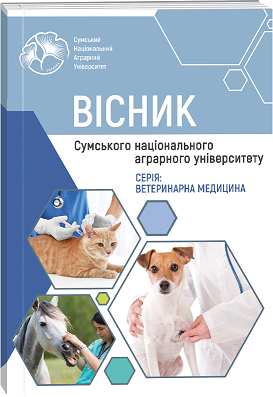THE EFFECT OF PROBIOTIC LACTOBACILLUS CASEI B-7280 ADDED IN DIFFERENT DOSES WITH SUGAR SYRUP ON THE VITALITY OF BEES
Abstract
The influence of the probiotic Lactobacillus casei B-7280 as part of stimulating feeding on the vital activity of honey bees was studied. Three groups of bees, 60-90 in each, were formed and selected from analogous families by weight, family strength, and queen age. The research was carried out under thermostat conditions. Bees of the control (C) group were fed with 60% sugar syrup in the amount of 2 ml/group/day. Experimental 1 group of bees (E 1) received the probiotic Lactobacillus casei B-7280 at a concentration of 109 CFU/ml with 2 ml of sugar syrup; experimental 2 group of bees (E 2) received probiotic Lactobacillus casei B-7280 at a concentration of 106 CFU/ml with 2 ml of sugar syrup. Bees were fed daily. The duration of feeding with syrup and probiotics is 30 days. The physiological state of the bees was recorded daily throughout the study period. Dead and alive bees were counted. Catalase activity was determined on a spectrophotometer using the ability of hydrogen peroxide to form a stable colored complex with molybdenum salts. The obtained results prove that the probiotic Lactobacillus casei B-7280 has a stimulating effect on the viability of honey bees of the Carpathian breed during 30 days of its use with sugar syrup under the conditions of a laboratory thermostat. Feeding the probiotic Lactobacillus casei B-7280 to honey bees in doses of 1×109 CFU/ml (E 1 group) and 1×106 CFU/ ml (E 2 group) under the conditions of a laboratory thermostat stimulated their viability, which is confirmed by the greater number of live bees in 6 -day periods of the experiment compared to the control group. The obtained results correlate with an increase in the catalase activity of bee body tissues and indicate a pronounced physiological effect of the applied doses of probiotic B-7280. Addition of probiotic B-7280 to sugar syrup increased (Р<0.05) the catalase activity of bee tissues both under the influence of higher (E 1) and lower (E 2) doses. The applied doses of the probiotic Lactobacillus casei B-7280 increased the viability of bees based on a number of live bees, which was more pronounced on 12, 24 and 30 days of the experiment. The average number of bees in the E 1 and E 2 groups for 30 days of the research exceeded the control group by 3.7 and 4.4%, respectively, but on the 24th and 30th days was higher by 8.6 and 12.3% in E 1 and 6.4 and 8.6% – in E 2 groups. These data indicate the advisability of using the probiotic Lactobacillus casei B-7280 in the applied concentrations to increase the viability of honey bees.
References
2. Amdam G.V., Omholt S.W. The regulatory anatomy of honeybee lifespan. J. Theor. Biol. 2002. 216, 209-228. doi:10.1006/jtbi.2002.2545
3. Daisley B., Pitek A., Chmiel J., Al K., Chernyshova A., Faragalla K., Burton J., Thompson G., Reid G. Novel probiotic approach to counter Paenibacillus larvae infection in honey bees. Multidisciplinary Journal of Microbial Ecology, 2020, 14(2), 476–491. doi: 10.338/s41396-019-0541-6
4. Daisley B., Pitek A., Chmiel J., Gibbons S. Lactobacillus spp. attenuate antibiotic-induced immune and microbiota dysregulation in honey bees Communications Biology 2020, 3, 534 https://doi.org/10.1038/s42003-020-01259-8
5. Döke M. A, Frazier M., Grozinger C.M. Overwintering honey bees: biology and management. Curr. Opin. Insect Sci. 2015. 10, 185-193. doi:10.1016/j.cois.2015.05.014
6. Eshbah, H. M., Mohamed, A. A., Hassan, A. R., Mahmoud, M. & Shaban, M. M. Efficiency of feeding honey bee colonies, Apis mellifera L., with mixture of natural products and sugar syrup on brood and adult population. Scientia Agriculturae, 2018. 21, 14–18. doi: 10.15192/PSCP.SA.2018.21.1.1418
7. Gemeda T. Testing the effect of dearth period supplementary feeding of honeybee (Apis mellifera) on brood development and honey production. International Journal of Advanced Research, 2014. 2, 319–324.
8. Klaenhammer, T R, Kleerebezem M, Kopp M V. & Rescigno M. The impact of probiotics and prebiotics on the immune system. Nat. Rev. Immunol.; 2012, 12, 728–734. doi: 10.1038/nri3312.
9. Kovalсhuk I.I., Fedoruk R.S., Spivak M.Ya., Romanovyсh M.M., Iskra R.Ya. Influence of immunobiotics B-7280 on the viability of honey bees and the content of essential and toxic microelements in the tissues of the organism. Microbiological Journal. 2021. 83 (2). 12-20. https://doi.org/10.15407/microbiolj83.02.042
10. Moustafa A. M., Mohamed A. A., Khodairy, M. M. Effect of supplemental feeding at different periods on activity and buildup of honey bee cololnies. Assiut University Assiut, 2000. 71526, 385–403.
11. Nelson C.M., Ihle K.E., Fondrk M.K., Page R.E., Amdam G.V. The gene vitellogenin has multiple coordinating effects on social organization. PLoS Biol. 2007. 5, 673-677. doi:10.1371/journal.pbio.0050062
12. Page R.E., Peng C.Y.S. Aging and development in social insects with emphasis on the honey bee, Apis mellifera L. Exp. Gerontol. 2001. 36, 695-711. doi:10.1016/s0531-5565(00)00236-9
13. Prado A., Requier F., Crauser D., Le Conte Y., Bretagnolle V., Alaux C. Honeybee lifespan: the critical role of preforaging state. Royal Society Open Scince. 2020. 7(11): 200998. https://doi.org/10.1098/rsos.200998
14. Ptaszyńska A. A., Borsuk, G., Zdybicka-Barabas, A., Cytryńska, M. & Małek, W. Are commercial probiotics and prebiotics effective in the treatment and prevention of honeybee nosemosis C? Parasitology research, 2016, 115(1), 397–406. doi: 10.1007/s00436-015-4761-z
15. Razanova O.P., Skrypnyk S.V. Vplyv probiotychnykh preparativ na rozvytok bdzholynykh simei u vesnianyi period [The influence of probiotic drugs on the development of bee families in the spring period] Bulletin of Sumy National Agrarian University. 2022, 2, 54-60 https://doi.org/10.32845/bsnau.lvst.2022.2.8 (in Ukrainian).
16. Romero S., Nastasa A., Chapman A., Kwong W. K, Foster L. J. The honey bee gut microbiota: strategies for study and characterization. Insect Mol Biol. 2019 28(4):455-472. doi: 10.1111/imb.12567
17. Rueppell O., Bachelier C., Fondrk M.K., Page R.E. Regulation of life history determines lifespan of worker honey bees (Apis mellifera L). Exp. Gerontol. 2007. 42, 1020-1032. doi:10.1016/j.exger.2007.06.002
18. Schulz M., Łos A., Grzybek M., Scibior R., Strachecka A. Piperine as a new natural supplement with beneficial effects on the life-span and defence system of honeybees. Journal of Agricultural Science, 2019, 157, 140–149. DOI:10.1017/S0021859619000431
19. Seehuus S.C., Norberg K., Gimsa U., Krekling T, Amdam G.V. Reproductive protein protects functionally sterile honey bee workers from oxidative stress. Proc. Natl Acad. Sci. USA 2006. 103, 962-967. doi:10.1073/pnas.0502681103
20. Tejerina M. R., Cabana M. J. Benitez-Ahrendts M. R. Strains of Lactobacillus spp. reduce chalkbrood in Apis mellifera. Journal of Invertebrate Pathology, 2021, 178, 107521. doi: 10.1016/j.jip.2020.10752
21. Tlak Gajger I., Vlainić J., Šoštarić P., Prešern J., Bubnič J., Smodiš Škerl M. I. Effects on Some Therapeutical, Biochemical, and Immunological Parameters of Honey Bee (Apis mellifera) Exposed to Probiotic Treatments, in Field and Laboratory Conditions. Insects, 2020, 11(9), 638. doi:10.3390/insects11090638
22. Topal, E., Mărgăoan, R., Bay, V., Takma, Ç.,Yücel, B.,Oskay, D., Düz, G., Acar, S. & Kösoğlu, M. The Effect of Supplementary Feeding with Different Pollens in Autumn on Colony Development under Natural Environment and In Vitro Lifespan of Honey Bees. Insects, 2022. 13, 588. doi: 10.3390/insects13070588
23. Topal, E., Yücel, B., Tunca, R.˙I. & Kösoglu, M. Effect of Feeding Honey Bees on Colony Dynamics. Journal of the institute of science and technology, 2019; 9, 2398–2408. doi: 10.21597/jist.532124
24. Vlizlo V. V. Laboratory methods of investigation in biology, stock-breeding and veterinary / V. V. Vlizlo, R. S. Fedoruk, I. B. Ratych et al. // Reference book ; Edited by V. V. Vlizlo. Lviv : SPOLOM, 2012, 764 p. (in Ukrainian)
25. Yazlovitska L.S., Kosovan M.D., Cherevatov V.F., Volkov R.A. The catalase activity of Apis mellifera L. upon summer feeding with varying carbohydrate diet. Biolohichni systemy. 2016; 8 (2): 182–188. doi:10.31861/biosystems2016.02

 ISSN
ISSN  ISSN
ISSN 



